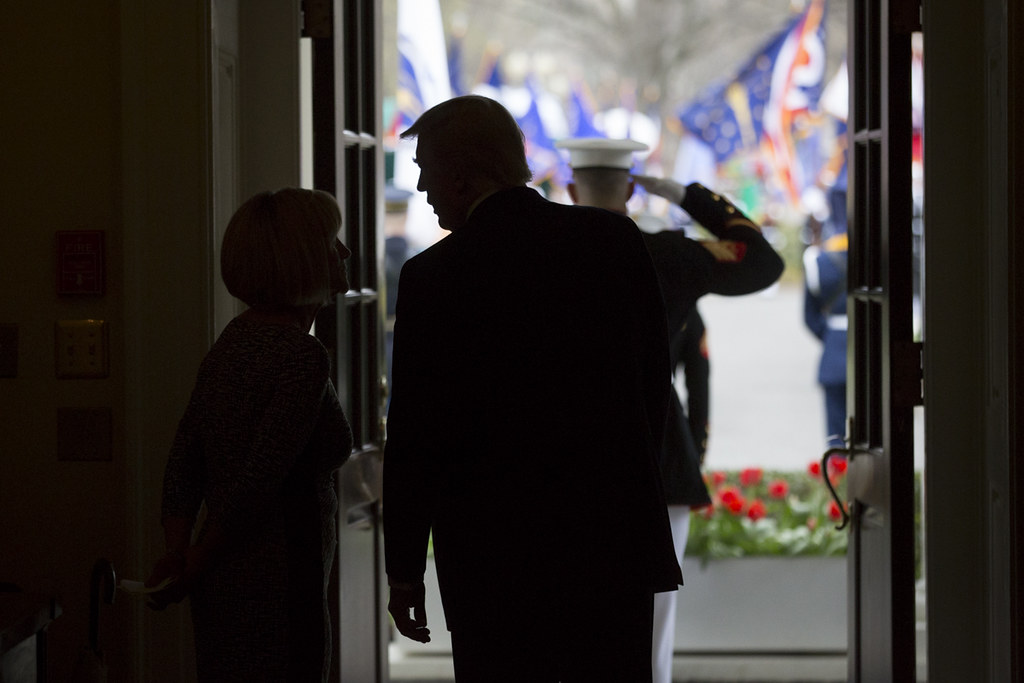How Trump Will Weaken the Presidency
Donald Trump has stoked new fears of an imperial presidency. His obvious fascination with the powers of foreign autocrats is unprecedented for an American president.

Published by The Lawfare Institute
in Cooperation With

Donald Trump has stoked new fears of an imperial presidency. His obvious fascination with the powers of foreign autocrats is unprecedented for an American president. His ignorant and dismissive attitude toward the rules and norms that help limit presidential power has generated widespread anxiety about the fragility of American democracy. His repeated assertion in tweets and public statements of the rarely imagined powers that he claims to hold in his hands is dismaying (though often highly dubious). He tries to convey the image of an American strongman.
But as is often the case with Trump, the appearance does not match the reality. There is ample evidence that the Trump presidency is quite weak, and he may well leave the office of the presidency weaker than he found it. Where his predecessors since Watergate have been gradually reacquiring power for the White House, Trump might find himself giving power back.
Political scientists have long emphasized that the real power of the presidency lies in the informal influence that a president can exercise, not in the formal constitutional power that he can wield. It is a sign of weakness, not strength, when a president must resort to using the weapons in his constitutional arsenal. A strong president does not need to issue vetoes, because he can shape the legislative agenda and persuade legislators to enact policies of which he approves. A strong president does not need to remove executive branch officers, because he can staff his administration with people who share his vision and can help him implement his goals. A strong president does not need to fall back on claims of executive privilege, because he can persuade legislators to channel their oversight in other directions and to trust the president’s judgment about information that must remain confidential.
A strong president persuades; he does not command. When persuasion fails, a president must fall back on giving orders or, even worse, find himself stymied by recalcitrant politicians and subordinates. Trump has issued few vetoes, but mostly because Congress has passed only a few bills. He has not been terribly effective in transforming his own policy agenda into legislation, which has forced him to fall back on often ineffectual executive orders. Even with the advantage of a Senate controlled by his own party and generally friendly to his nominees, he has barely been able to staff his own administration. His greatest success has been in the realm of judicial appointments, where he has ceded the decision making to others. The president has been able to publicly and privately humiliate his own staff and officers, but he often fails to convince them to carry out his wishes. If President Trump is a would-be autocrat, he has shown no capacity to exercise autocratic power.
On the formal dimensions of presidential power, Trump might well wind up weakening the presidency by overreaching. The president has made a habit of issuing executive orders, such as his travel ban and his swipe at sanctuary cities, without much planning or careful thought about either their legality or their policy efficacy. As a consequence, the Trump White House has created opportunities for opponents of his administration to exploit vulnerabilities and encourage greater judicial scrutiny of how the president exercises his discretionary authority. The administration has repeatedly advanced policies, such as the declaration of a national emergency to fund a border wall, with the thinnest veneers of legal justification—veneers that the president himself, to the consternation of his lawyers, often strips away with his own words. As a result, the administration has ended up daring the courts to show the kind of deference traditionally granted to presidents who have more carefully and more cautiously used the powers available to them. Now Trump has embarked on an unprecedented campaign of obstruction of congressional oversight that will likely force the courts to reevaluate the scope of executive privilege and the limits of legislative investigatory authority.
It is a familiar refrain that bad cases make bad law. Legal rules that are drafted to account for unusual fact situations can deform the law in ways that make it less well adjusted to respond to more routine situations. Trump’s attempts to push his legal powers to their outermost extremes risk having the courts trim away those powers. In the past, presidents who have won the trust of judges and legislators have been accorded more practical power to exercise discretion and to enjoy deference. With the loss of trust, that discretion is likely to be restricted.
By persistently testing the limits of the president’s constitutional and legal powers, Trump forces his defenders to offer increasingly strained legal arguments to justify his actions. By declaring a national emergency where none exists and proposing to use funds to pay for “military construction projects” that have no military purpose, Trump dares the courts to call his bluff and expose the fact that his legal arguments are offered in bad faith. By declaring that, in his view, preexisting oversight efforts were “enough” and so the administration will be “fighting all the subpoenas,” he invites Congress and the courts to assume that his resistance to congressional oversight is purely personal and has no firm basis in a reasonable desire to protect the institutional prerogatives of the executive branch.
And by making blanket assertions of executive privilege over testimony and documents that cannot be easily tied to the traditional grounds for protecting the internal confidences of the executive branch, he challenges Congress and the courts to strip away the veils of privilege. When, in 1958, Attorney General William P. Rogers explained the importance of executive privilege to a Congress that was frequently trying to cast it aside, he emphasized that “non-disclosure can never be justified as a means of covering mistakes, avoiding embarrassments, or for political, personal, or pecuniary reasons.” Trump’s “blanket refusal” to cooperate with congressional investigations, on the other hand, invites the conclusion that the administration’s actions are guided less by constitutional scruples than by a desire to avoid the exposure of dirty laundry.
The president is, of course, not alone in rushing into a constitutional game of chicken. Members of the Democratic leadership have been cautious to emphasize that they are not “going to rush in and beat up on Trump,” but both sides understood that the Democratic victory in the midterm elections would result in the House making Trump’s life miserable. House committees have moved remarkably quickly to issue subpoenas, contempt citations and impeachment threats at the expense of more routine and informal negotiations. The American separation of powers works in no small part because government officials have built up norms and practices that ease tensions and provide the means for navigating impasses. The current polarized political climate has encouraged officials to strip away these informal mechanisms of comity and cooperation, leaving the gears of government to grind away and lock up.
The president will no doubt win some of these legal battles, but he will lose some as well. In doing so, he will leave his successors hemmed in by more constricting legal rules and adverse judicial precedents, and will encourage legislators and judges to be more mistrustful of presidential claims and less willing to invest the presidency with authority and discretion. Future presidents who will need the flexibility to respond to genuine emergencies and to protect valuable secrets will find themselves less well situated to do so because this president has squandered political and legal capital. In the past, presidents have benefited from the fact that they have not generally had to put the limits of their legal authority to the test. His bold assertions of executive prerogative might make President Trump temporarily feel powerful, but that sense of potency will likely prove fleeting.




